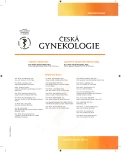Guideline for prevention of RhD alloimmunizationin RhD negative women
Authors:
M. Lubušký 1,2; M. Procházka 1; O. Šimetka 3
; I. Holusková 4
Authors‘ workplace:
Porodnicko-gynekologická klinika LF UP a FN, Olomouc, přednosta prof. MUDr. R. Pilka, Ph. D.
1; Ústav lékařské genetiky a fetální medicíny LF UP a FN, Olomouc, přednosta prof. MUDr. J. Šantavý, CSc.
2; Porodnicko-gynekologická klinika FN, Ostrava, přednosta doc. MUDr. V. Unzeitig, CSc.
3; Transfuzní oddělení FN, Olomouc, přednosta MUDr. D. Galuszková, Ph. D., MBA
4
Published in:
Ceska Gynekol 2013; 78(2): 132-133
Category:
Recommended methods
České gynekologické a porodnické společnosti (ČGPS)
České lékařské společnosti Jana Evangelisty Purkyně (ČLS JEP)
Revize doporučeného postupu ČGPS ČLS JEP ze dne 3. 6. 2010, publikovaného v Čes. Gynek. 2010, 75, č. 4, s. 323–324.
Schváleno výborem ČGPS ČLS JEP dne 25. 1. 2013.
Overview
Events following which immunoglobulin (Ig) G anti-D should be given to all RhD negative women with no anti-D alloantibodies: First trimester indications (IgG anti-D sufficient dose of 50 μg*) - termination of pregnancy, spontaneous abortion followed by instrumentation, ectopic pregnancy, chorionic villus sampling, partial molar pregnancy; Second and third trimester indications (IgG anti-D sufficient dose of 100 μg*) - amniocentesis, cordocentesis, other invasive prenatal diagnostic or therapeutic procedures, spontaneous or induced abortion, intrauterine fetal death, attempt at external cephalic version of a breech presentation, abdominal trauma, obstetric hemorrhage; Antenatal prophylaxis at 28th weeks of gestation (IgG anti-D sufficient dose of 250 μg*); Delivery of an RhD positive infant** (IgG anti-D sufficient dose of 100 μg*); Minimal dose*: before 20 weeks gestation – 50 μg (250 IU), after 20 weeks gestation*** – 100 μg (500 IU); Timing: as soon as possible, but no later than 72 hours after the event. In cases where prevention of RhD alloimmunization is not performed within 72 hours of a potentially sensitising event, it is still reasonable to administer IgG anti-D within 13 days, and in special cases, administration is still recommended up to a maximum interval of 28 days postpartum; Legend: *administration of a higher dose of IgG anti-D is not a mistake, ** also if the D type is not known, *** simultaneous assessment of the volume of fetomaternal hemorrhage (FMH) to specify the dose is suitable; The FMH volume assessment - If the volume of fetal erythrocytes (red bood cells, RBCs) which entered maternal circulation is assessed, intramuscular administration of IgG anti-D in a dose of 10 μg per 0.5 mL of fetal RBCs or 1 mL of whole fetal blood is indicated. IgG anti-D in a dose of 10 μg administered intramuscularly should cover 0.5 mL of fetal RhD positive RBCs or 1mL of whole fetal blood. FMH is the fetal RBC volume; fetal blood volume is double (expected fetal hematocrit is 50%).
Keywords:
RhD negative women –RhD alloimmunization – prevention – immunoglobulin G anti-D
Sources
1. Lubušký, M. Prevence RhD aloimunizace. Evidence Based Medicine a přehled doporučených postupů. Postgrad Med, 2010, 12(2), s. 194–198.
2. Lubušký, M. Prevence Rh (D) aloimunizace u Rh (D) negativních žen. Prakt Gyn, 2008, 12(2), s. 100–103.
3. Lubušký, M., Procházka, M., Krejčová, L., Větr, M., Šantavý, J., Kudela, M. Prevence Rh (D) aloimunizace u Rh (D) negativních žen v těhotenství a po porodu Rh (D) pozitivního dítěte. Čes Gynek, 2006, 71(3), s. 173–179.
Labels
Paediatric gynaecology Gynaecology and obstetrics Reproduction medicineArticle was published in
Czech Gynaecology

2013 Issue 2
-
All articles in this issue
- Selective progesterone receptor modulators and their therapeutical use
- L-arginin in prevention and treatment of pre-eclampsia
- Systemic enzyme therapy in the treatment of recurrent vulvovaginal candidiasis
- Evaluation of p16 protein in the managementof cervical dysplasia
- Reccurent pregnancy loss – review
- Guideline for prevention of RhD alloimmunizationin RhD negative women
- Pregnancy and multiple sclerosis –outcomes analysis 2003–2011
- Hyperlipidaemia in pregnancy
-
Psychosocial climate in maternity hospitals from the perspective of parturients I.
Results from a national survey on perinatal care satisfactionusing a representative sample of 1195 Czech parturients -
Cancer stem cells and ovarian cancer
Characteristics, importance and potential applicationsin clinical practice - Retroperitoneal lymphangioleiomyomatosis – a case reports
- Transfusion-related acute lung injury (TRALI) – review
- Blockade of calcium channels – a perspectiveof male contraception?
- Atlas of gametes and embryos of several animals and human
- Czech Gynaecology
- Journal archive
- Current issue
- About the journal
Most read in this issue
- Transfusion-related acute lung injury (TRALI) – review
- Reccurent pregnancy loss – review
- Evaluation of p16 protein in the managementof cervical dysplasia
- Hyperlipidaemia in pregnancy
